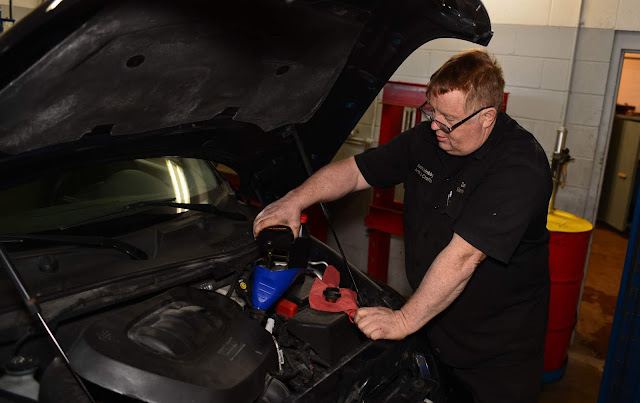Check Out These Wonder Tips About Auto Repair In The Article Below
Check the transmission fluid every two to three months. Let your engine run and open the hood of your car. Use the transmission dipstick to check the fluid levels. If there is not enough fluid in your transmission you probably have a leak somewhere in your system. It is best to take the car to a mechanic so he can locate the leak.
If your vehicle begins making a louder noise than usual, you should suspect the muffler needs replacing. This is a job best done at a shop because it is difficult to work under a car without a lift. You can get a warning or even a ticket if your muffler sounds too loud.
Take advantage of free inspections, but don't just have them fix everything on the list. There will probably be one or two extra items added on that aren't strictly necessary. If you are light on cash, ask the technician which items are the most important to keep the car running safely. Get these done immediately, and save up for the rest of the work.
When you are going to get your car repaired at a shop, ask the technician what type of parts they plan to use to get the job done. Many places use refurbished parts, but they would be willing to use new parts if you wanted to pay the extra money.
If you are worried about an auto body shop puffing up the amount of work that needs to be done, go and get free diagnostics from somewhere else. Since there is no guarantee you will get work done by them, they have no reason to claim there is more needed than necessary.
In addition to basic tire changing equipment, keep a plastic tote filled with DIY auto repair supplies in the trunk of your car in case of emergencies. Fill it with at least a quart each of motor oil, transmission fluid, steering fluid, and brake fluid and a gallon of water. Add a can of penetrating oil spray, a roll of duct tape, twine, bungee cords and basic tools so that you can manage minor repairs on the road.
Look out for signs that your mechanic isn't very good. If they beat around the bush and act shifty, they may not be the one you want to work with. It is good to feel like you trust your mechanic, so move on if you don't feel like you can.
Take action if you believe a garage or dealership ripped you off. Notify one of the manager and give them a chance to issue a refund. If you are still not satisfied, contact your local Better Business Bureau to file a complaint. Your city or state consumer affair office is also a good resource.
You can easily fix scratches yourself. You will need to fill the scratch with a primer that corresponds to the colors of your car, apply some paint once the primer is dry and sand the entire area. Start with a fine sand paper and increase the grain progressively before waxing.
Do your research prior to choosing any auto repair company. Don't trust solely the company's website. Look to auto forums and be wary of any complaints you may see. Also take into consideration any rave reviews the auto shop receives. These are typically objective reviews, so you can trust them more than what the shop's materials may say.
Although the dealer for your car's make may provide the highest expertise when it comes to repair service, it may not always be the most cost effective choice. Many independent car repair shops have technicians that formerly worked at dealerships and are factory trained. You may be able to save a good amount by choosing an independent shop over the dealer, without a loss of quality.
If you have a maintenance log, devote yourself to keeping it up-to-date. If it isn't, your car may undergo repairs that are not necessary and do nothing to help you. Further, this log is an indication to those working on your car that you expect the best for your vehicle.
Check a variety of sources of information before attempting an auto repair for the first time. Do a good online search, watch instructional videos and seek out books at your local library and take time to talk with an experienced mechanic before you dive in to try that repair. Once you feel comfortable with the concept, make a list of the things you need and the steps you will need to take to make the repair successfully.
If you are taking your car to the repair shop for service, be sure you know how they charge for the work being done. Many shops charge a flat rate for most jobs, but others charge based on the amount of time it takes to complete a repair. While both methods can be quite legitimate, it is useful to know which approach your shop is using to help you anticipate final costs.
If you receive a repair estimate in excess of a couple of hundred dollars, get things in writing. You may want to file a formal complaint, and the written quote can be proof. In addition, your mechanic will likely not perform unnecessary repairs whenever he or she already has a written quote.
When looking for a repair shop or a garage, pay attention to the documents on the walls. Certified mechanics usually have the original copy of their certification framed on the wall. You should look for certifications issued by your state or by the ASE as well as proofs of insurance.
A mechanic can be your best friend if your car is acting up and you are not sure how to fix it yourself. The tips in this article should have given you some guidance on this matter. Remember them the next time you find yourself in need of auto repair!




Comments
Post a Comment